High-Level Policy Session 5: ICT Applications and Services
WSIS
Session 459
"The usage and deployment of ICTs should seek to create benefits in all aspects of our daily life. ICT applications are potentially important in government operations and services, health care and health information, education and training, employment, job creation, business, agriculture, transport, protection of environment and management of natural resources, disaster prevention, and culture, and to promote eradication of poverty and other agreed development goals. ICTs should also contribute to sustainable production and consumption patterns and reduce traditional barriers, providing an opportunity for all to access local and global markets in a more equitable manner. Applications should be user-friendly, accessible to all, affordable, adapted to local needs in languages and cultures, and support sustainable development. To this effect, local authorities should play a major role in the provision of ICT services for the benefit of their populations."
Geneva Declaration of Principles, https://www.itu.int/net/wsis/docs/geneva/official/dop.html
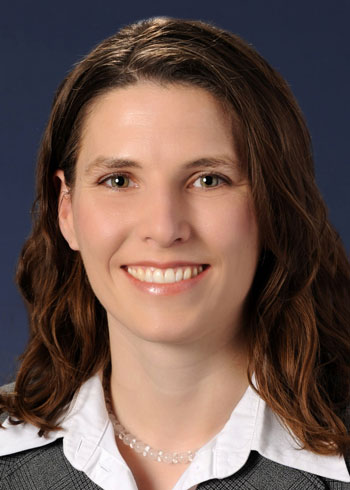

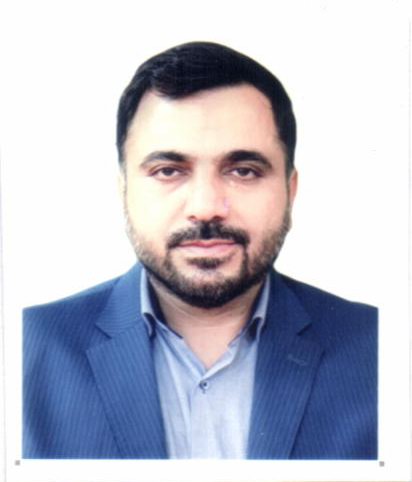
2021-Present, ICT Minister, Ministry of Information and Communication Technology (ICT)
2019-2021, Head of Statistics and Information Technology Center, Judiciary of Islamic Republic of Iran
2006-2011, Founder and President of the Center for the Development of Information Technology and Digital Media, Ministry of Culture and Islamic Guidance
2006-2009, Member of the Strategic Commission, High Council of Information Technology
2017-Present, Faculty Member, Iran University of Science and Technology
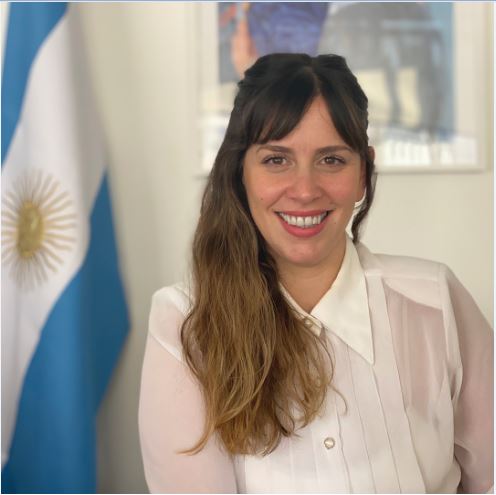
Secretary of State for Technological Innovation of the Public Sector of the Chief of Cabinet of Minister's Office from Argentina.
She has a degree in Communication Sciences from the University of Buenos Aires (UBA), with a postgraduate degree in Design and Evaluation of Public Policies (Pompeu Fabra University). She is also a researcher and teacher.
She coordinated the postgraduate courses “ICT: Internet, policies and society'' (National University of Tres de Febrero) and "Digital platforms and interconnected society" (National University of Avellaneda). She also directed the Workshop on Digital and Political Communication Strategies of the Master's Degree in Political and Institutional Communication of the Ortega y Gasset University Research Institute (Complutense University of Madrid).
In addition, she was in charge of the project on digital signature and digital management of judicial files in the Secretariat of Innovation of the Council of the Magistracy of the City of Buenos Aires, where she also directed the training team of the General Directorate of Informatics and Technology.
In the private sector, she was in charge of the Communication and Development area of the i-ciudad Public Policy Institute and the Intercargo handling company.
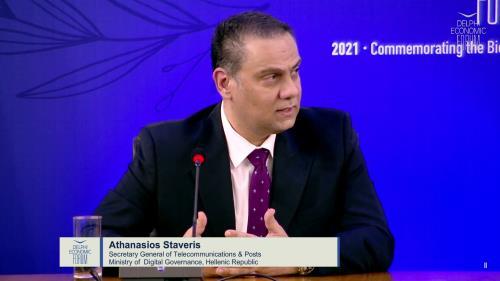
Dr. Athanasios Staveris-Polykalas, completed his Bachelor Degree in Physics from University Of Athens and Masters in Applied Physics and Mathematics from NTUA. He completed his PhD in High Energy Physics.
He worked as a researcher in the international experiment of CDF at Fermilab USA, under European Scholarship (RTN) and in co-operation with Instituto Nazionale di Fisica Nucleare Sezione di Pisa. Furthermore he has over 10 years professional experience in large scale ICT projects in private sector. He specializes in data analysis, use of AI and ML algorithms and Natural Language Processing.
From July 2019 since November 2020 he worked as Technology Advisor to the Minister of Digital Governance Hellenic Republic. Since November 2020, he holds the position of Secretary General of Telecoms and Posts, under the Ministry of Digital Governance – Hellenic Republic.
He is responsible for Space strategy implementation of Greece, Cyber Security, use of new technologies in telecommunications (AI/IoT) and the design of sustainable and resilient telecommunication infrastructures aligned with Secure Connectivity initiative, etc
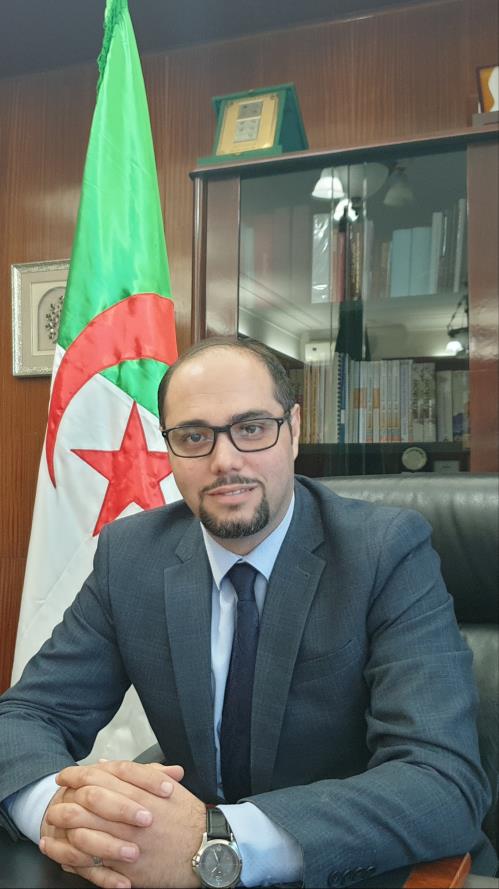
M. Belattar is a professional in Information and Communication Technology (ICT) with extensive work experience in the Algerian government spanning areas, such as ICT policy, governance board, administration, finance, regulation, and economics.
Since 2019, M. Belattar has been Chairman of the Post and Electronic Communications Regulatory Authority Board, which is leading the regulation and promotion of the postal and electronic communications sectors in Algeria. In addition, M. Belattar is currently chairman of the Arab Regulators Network of telecommunications and information technologies.
Between 2016 and 2019, M. Belattar held several positions in the post and telecommunications sector. These positions include general inspector at the Algerian Ministry of Post and Information and Communication Technologies as well as chairman of the Board of the postal operator from 2017 to 2019.
Besides his several positions, M. Belattar also carried out managerial missions, such as being a member of the Board in a couple of companies operating in the fields of mobile telephony, satellite communications, ICT, and the credit guarantee for SMEs.
M. Belattar started his career in the financial sector before joining the Algerian Court of accounts as a magistrate in February 2014.
M. Belattar holds a diploma in administration and a doctorate in public law.
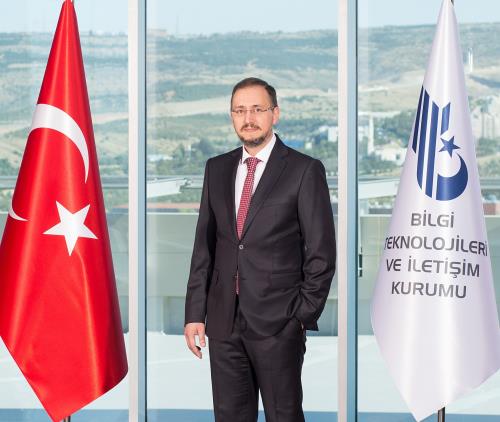
Mr. Omer Abdullah Karagözoğlu is the Chairman of the Board and President of the Information and Communication Technologies Authority (ICTA/BTK) of the Republic of Turkey since August 13, 2018.
He was born in Glasgow, Scotland in 1975. He is an Electrical and Electronic Engineer graduated from Eastern Mediterranean University.
Mr. Karagözoğlu worked as a software engineer at Istanbul Water and Sewerage Administration (İSKİ) of Istanbul Metropolitan Municipality (IMM) from 2002 to 2004. Between 2002 and 2016, he held various managerial positions at BELBIM, a technology company of IMM.
He served as the Adviser to the Chairman and Board Member of the ICTA/BTK from 2016 to August 13, 2018.
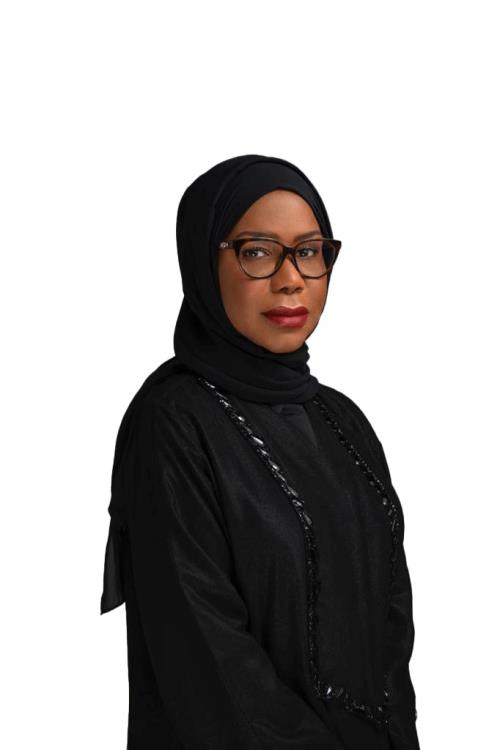
Mubaraka Ibrahim is a widely-lauded digital transformation generalist in the medical and government space. Currently acting as CIO of the Information Sector — and as Director of Health Information Systems — in the recently-decreed Emirates Health Services Establishment, her >20 year career track record includes previous deputyship of all computing functions at the UAE’s Ministry of Health and Prevention (MOHAP), where she led 160+ key personnel towards multiple federal healthcare technology projects... such as the Riayati (National Unified Medical Record) patient integrations and Tatmeen (Track & Trace) for securing pharmaceutical supply chains that uphold post-pandemic resiliency.
Inaugural member of HIMMS Middle East, Mubaraka has participated as keynote speaker in numerous conferences, exhibitions and discussions in the field, both regionally and internationally. She was selected among top 50 Middle East IT leaders by HIMSS organization, she is also the recipient of a Women's Leadership Award in 2018 and the GovTech Innovation Awards in 2020 for Woman in Government of the year. She is a member of the UAE Government Team towards the next 50 which reflects a small part of the impressive series of achievements in her career. Academically,Mubaraka is a Master of Information Management Systems from theAmerican Universityin Washington, D.C., and holds a Healthcare Leadership Diploma from theHarvard School of Public Health, with a Bachelor’s degree in Computer Science from Kuwait University.
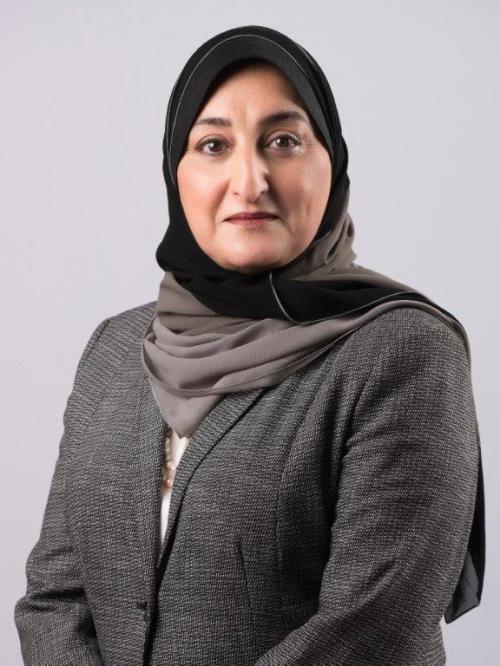
Engineer Maryam Ahmed Jamaan
Chairman of the Board of Directors - Telecommunications Regulatory Authority
practical positions
- Chairman of the Board of Directors of the Telecommunications Regulatory Authority
- Member of the Supreme Council for Women in the fourth, fifth and sixth sessions.
- Undersecretary of the Ministry of Transport and Communications for Land Transport and Post Affairs.
- A representative of the government in the board of directors of the King Fahd Causeway General Corporation.
- Senior Project Manager at the Economic Development Board.
- Director of the Public Sector Reform Department at the Economic Development Board.
- Director of Planning and Studies Department at the Ministry of Electricity and Water.
Academic certificates
She received a "Fellowship" degree at the British Institute of Engineering and Technology, as the first woman in the Arab world and the Middle East and North Africa region to receive a fellowship from the Foundation in the field of electrical engineering.
It is noteworthy that the Fellowship of the British Engineering and Technology Foundation is considered the highest degree of membership and is granted only to members who have demonstrated a high level of responsibility, achieved many achievements and maintained an outstanding level of professionalism during their years of work.
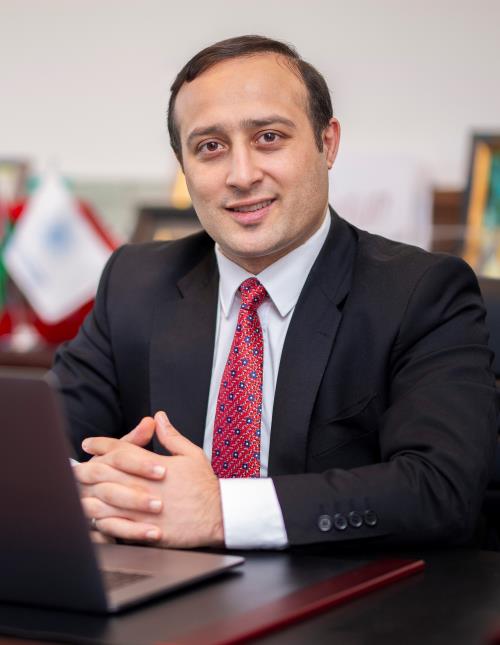
Mr. Fariz Jafarov, director of the E-Gov Development Center of Azerbaijan which is responsible for the digitization of public services, coordination of digital government transformation, interoperability of government information system, and delivery of digital public services via eGovernment portal.
Mr. Jafarov is an MBA graduate from the Webster Graduate School London. He is a holder of the master certificate from the George Washington University in Project Management, and another certificate from Duke University in the field of Adaptive Strategy Management. He also holds a bachelor's degree in Public Administration from the Public Administration Academy of Azerbaijan and the internationally recognized “ITIL Foundation” certificate in IT Service Management.
Being a civil servant in different Government Agencies in Azerbaijan, for the last 10 years he has been working in the State Agency for Public Service and Social Innovations under the President of the Republic of Azerbaijan (ASAN Service – internationally known as an Azerbaijani brand of one-stop-shop based service delivery center) in various advisory and leadership positions.
Currently, he is a part of the first cohort of the Master in Artificial Intelligence for Public Services (AI4Gov) funded by the European Commission and supported by four leading European universities in the field of technology.
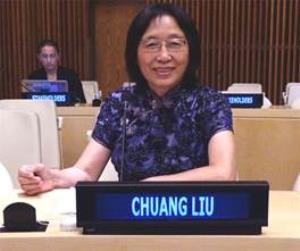
Dr. LIU Chuang is professor of Institute of Geographical Sciences and Natural Resources Research, Chinese Academy of Sciences and Director of the Global Change Research Data Publishing & Repository (GCdataPR), World Data System (WDS) of International Science Council (ISC), Director of China GEO Data Publishing Center and Secretary General of Big Data Working Committee of Geographical Society of China (GSC).
She is Editor-in-Chief of Digital Journal of Global Change Data Repository, Executive Associate Chief Editor and Director of Journal Global Change Data & Discovery. She is PI of the Big Data and Internet Things Technology on Geographical Indications for Environment and Sustainability (GIES), A Joint 2021-2030 Decadal Program for implementation of UN SDGs. She had been leading the international group on Scientific Data Sharing in/for/with Developing Countries for bridging the digital divide for meeting the WSIS agenda for more than 20 years. She has published more than 200 research digital datasets and was awarded the CODATA Prize in 2008; share the AAP PROSE Award for the GEO-6 of UNEP in 2020 and Outstanding Editor Prize of Chinese Association for Science and Technology in 2021. She led the projects on GCdataPR and COVID-19 Knowledge and Data Hub were awarded WSIS Prize (2008, 2021, e-science, champion).
She got her Ph.D. in Department of Geography of Peking University, China in 1989, she was Associate Professor of Peking University, China 1989-1991, Visiting Professor in Department of University of British Columbia, Canada 1992-1993, Information Scientist in Center of Earth Science Information Network (CIESIN), USA from 1994-1998, and Professor of Institute of Geographical Sciences and Natural Resources Research, Chinese Academy of Sciences since 1999.

Dr. Barakabitze is a Lecturer of ICTs in the Department of Informatics and Information Technologies. He completed his PhD in Computing and Communications from the University of Plymouth, UK in 2019. He received the degree in Computer Science with Honours from the University of Dar es Salaam, Tanzania in 2010 and Master Degree of Electronics and Communication Engineering with first class from Chongqing University, PR China, in May 2015. Dr. Barakabitze is recognised as the BEST Male ICT Researcher of 2021, an award that is awarded by the ICT Commission of Tanzania. He was also the BEST Young Researcher of the Year 2021 at Sokoine University of Agriculture where he works. Barakabitze is also recognised as the 2015 outstanding International Graduate Student of Chongqing University, China due to his excellent performance. He was a visiting researcher in the Department of Electrical and Electronics Engineering, University of Cagliari, Italy and the ITU-T-Standardization Department in 2016 and 2017 respectively. He has numerous publications in International peer-reviewed conferences and journals. Barakabitze has served as session chair of Future Internet and NGN Architectures during the IEEE Communication Conference in Kansas City, USA. He was also the Keynote and Panel Chairs at the International Young Researcher Summit on Quality of Experience in Emerging Multimedia Services (QEEMS 2017), which was held from May 29–30, 2017 in Erfurt, Germany. Mr.Barakabitze is a Reviewer for various journals and serves on technical program committees of leading conferences focusing on his research areas. His research interests are 5G, Quality of Experience (QoE), network management, video streaming services, SDN and NFV.
-
 C7. ICT applications: benefits in all aspects of life — E-government
C7. ICT applications: benefits in all aspects of life — E-government
-
 C7. ICT applications: benefits in all aspects of life — E-business
C7. ICT applications: benefits in all aspects of life — E-business
-
 C7. ICT applications: benefits in all aspects of life — E-learning
C7. ICT applications: benefits in all aspects of life — E-learning
-
 C7. ICT applications: benefits in all aspects of life — E-health
C7. ICT applications: benefits in all aspects of life — E-health
-
 C7. ICT applications: benefits in all aspects of life — E-employment
C7. ICT applications: benefits in all aspects of life — E-employment
-
 C7. ICT applications: benefits in all aspects of life — E-environment
C7. ICT applications: benefits in all aspects of life — E-environment
-
 C7. ICT applications: benefits in all aspects of life — E-agriculture
C7. ICT applications: benefits in all aspects of life — E-agriculture
-
 C7. ICT applications: benefits in all aspects of life — E-science
C7. ICT applications: benefits in all aspects of life — E-science
-
 Goal 1: End poverty in all its forms everywhere
Goal 1: End poverty in all its forms everywhere
-
 Goal 2: End hunger, achieve food security and improved nutrition and promote sustainable agriculture
Goal 2: End hunger, achieve food security and improved nutrition and promote sustainable agriculture
-
 Goal 3: Ensure healthy lives and promote well-being for all
Goal 3: Ensure healthy lives and promote well-being for all
-
 Goal 4: Ensure inclusive and equitable quality education and promote lifelong learning opportunities for all
Goal 4: Ensure inclusive and equitable quality education and promote lifelong learning opportunities for all
-
 Goal 5: Achieve gender equality and empower all women and girls
Goal 5: Achieve gender equality and empower all women and girls
-
 Goal 6: Ensure access to water and sanitation for all
Goal 6: Ensure access to water and sanitation for all
-
 Goal 7: Ensure access to affordable, reliable, sustainable and modern energy for all
Goal 7: Ensure access to affordable, reliable, sustainable and modern energy for all
-
 Goal 8: Promote inclusive and sustainable economic growth, employment and decent work for all
Goal 8: Promote inclusive and sustainable economic growth, employment and decent work for all
-
 Goal 9: Build resilient infrastructure, promote sustainable industrialization and foster innovation
Goal 9: Build resilient infrastructure, promote sustainable industrialization and foster innovation
-
 Goal 10: Reduce inequality within and among countries
Goal 10: Reduce inequality within and among countries
-
 Goal 11: Make cities inclusive, safe, resilient and sustainable
Goal 11: Make cities inclusive, safe, resilient and sustainable
-
 Goal 12: Ensure sustainable consumption and production patterns
Goal 12: Ensure sustainable consumption and production patterns
-
 Goal 13: Take urgent action to combat climate change and its impacts
Goal 13: Take urgent action to combat climate change and its impacts
-
 Goal 14: Conserve and sustainably use the oceans, seas and marine resources
Goal 14: Conserve and sustainably use the oceans, seas and marine resources
-
 Goal 15: Sustainably manage forests, combat desertification, halt and reverse land degradation, halt biodiversity loss
Goal 15: Sustainably manage forests, combat desertification, halt and reverse land degradation, halt biodiversity loss
-
 Goal 16: Promote just, peaceful and inclusive societies
Goal 16: Promote just, peaceful and inclusive societies
-
 Goal 17: Revitalize the global partnership for sustainable development
Goal 17: Revitalize the global partnership for sustainable development